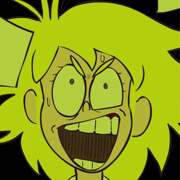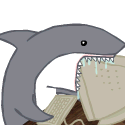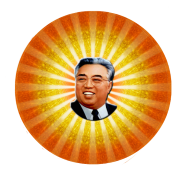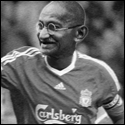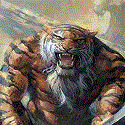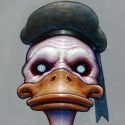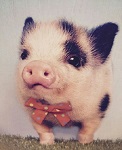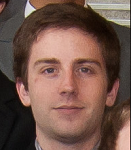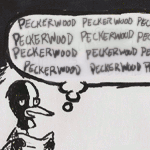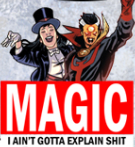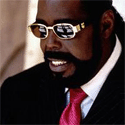|
This steampunk talk makes me wonder if the Foglios coined the term "gaslamp fantasy" just so their comic wouldn't be tarred with the steampunk brush.Grimson posted:I'm like 85-90% of the way through The Big Book of Science Fiction and while I've enjoyed it I've come to the conclusion that Jeff VanderMeer's personal bent towards "weird" sci fi and horror has caused the collection to have a definite bent towards the spooky, horrifying, and apocalyptic. I can see how that would be a problem for other people, but not for me. Xotl posted:I've only really decided to dig into SF in the past couple of years, after bouncing hard off of whatever our library had when I was a kid (Asimov and Clarke, I think). I wouldn't have been able to put it into words then, and it's been two or three decades, but I seem to recall finding the characters boring and the prose flat. At the same time, I'm interested in exploring some of the earlier stuff in the genre, which doesn't seem to come up here much. I just picked up The Stars My Destination and Bradbury's short story collection Golden Apples of the Sun; the Bester is fun so far but no great shake in the prose department (fabulous opening line aside), whereas Bradbury is very lyrical but to the point of sometimes overwhelming the story, and he seems a bit thin in terms of plot. I remember The Forever War being poignant and engrossing.
|
|
|
|

|
| # ? Jun 6, 2024 12:10 |
|
Xotl posted:I've only really decided to dig into SF in the past couple of years, after bouncing hard off of whatever our library had when I was a kid (Asimov and Clarke, I think). I wouldn't have been able to put it into words then, and it's been two or three decades, but I seem to recall finding the characters boring and the prose flat. At the same time, I'm interested in exploring some of the earlier stuff in the genre, which doesn't seem to come up here much. I just picked up The Stars My Destination and Bradbury's short story collection Golden Apples of the Sun; the Bester is fun so far but no great shake in the prose department (fabulous opening line aside), whereas Bradbury is very lyrical but to the point of sometimes overwhelming the story, and he seems a bit thin in terms of plot. Heinlein's Have Spacesuit - Will Travel is essentially a YA classic from then that in my opinion still holds up really well. It was just fun. Joanna Russ's Female Man. Thought it was great. A lot of exploration of gender in ways that I found interesting. She's not like Ursula Le Guin, but it's ~kinda~ in the same vein. This was from the later 70's though. I just don't hear anyone talking abotu Russ ever, so I wanted to make mention of her.  Olaf Stapledon's Sirius was fantastic, but you may prefer something like his 'The Last and First Men' + 'Star Maker'. I honestly don't really have a favorite of those two sets, but I really like Stapledon. Cordwainer Smith is pretty dope. Norstrilia. Just read the summary yourself. It's quite fun. Hal Clement wrote a really cool set of stories called Heavy Planet It's early Hard Sci-Fi and from the 50's or whatever, so it's more interesting than it is a good read. I liked it a lot, but I recognize that the story itself isn't that great. To be fair, most Hard Sci Fi has that struggle. Dark Benediction is by the dude who wrote Canticle for Liebowitz. I much prefer these stories to that. Canticle is unarguably great, though. I remember many years ago my brother telling me to read Of Men and Monsters as we overlap in taste on occasion, but I never got around to it. He really liked it. It's like a reverse Gulliver's Travels. Clifford Simak's City is also good. It's a series of interconnected stories. It's about the end of the world and after, as told by dogs. I don't see a lot of talk abotu Ted Sturgeon, but he's pretty dope. Most of his stories are well worth a read, but More Than Human is a fantastic place to start. Ursula Le Guin - Left Hand of Darkness, of course. A lot of Le Guin's stuff is just really interesting no matter what. Stranger in a Strange Land was AN IMPORTANT novel for me when I first read it in high school. For all the poo poo Heinlein gets I think it was a really good book and am not embarrassed to say I liked it. Check out Moon is a Harsh Mistress, as well. One of my favorite sci-fi books that's modern-old is The Forever War, by Joe Haldeman. James Tiptree's stories are also deffo worth reading. She's one of my favorites. Ten Thousand Light-Years, and Her Smoke Rose Up Forever are the best places to start.
|
|
|
|
There's also Samuel Delany--Nova or Babel-17 are his most famous. Octavia Butler started writing in the 70s though her career really blossomed later. Doris Piserchia is an obscure author who worked through the 60s and 70s. Spaceling is my favorite of hers, and in the last couple years she got cheap Kindle editions of her books. C J Cherryh wrote the Mri trilogy in the 70s, and while it's not her strongest work (that was and is still coming) it was interesting and not well known. J G Ballard's The Drowned World is a tale of post-environmental collapse from very early in the days of global activism. I agree with the poster above that some older SF can be kind of hard to get into, writing styles have changed (and changing writing style was a big argument between the old and new wave) and so have our obsessions. Old SF writers going on about overpopulation and Communism just all seems quaint now.
|
|
|
|
There seems to be a distinct lack of Phil Dick in the above recommendations.
|
|
|
|
Xotl posted:I've only really decided to dig into SF in the past couple of years, after bouncing hard off of whatever our library had when I was a kid (Asimov and Clarke, I think). I wouldn't have been able to put it into words then, and it's been two or three decades, but I seem to recall finding the characters boring and the prose flat. At the same time, I'm interested in exploring some of the earlier stuff in the genre, which doesn't seem to come up here much. I just picked up The Stars My Destination and Bradbury's short story collection Golden Apples of the Sun; the Bester is fun so far but no great shake in the prose department (fabulous opening line aside), whereas Bradbury is very lyrical but to the point of sometimes overwhelming the story, and he seems a bit thin in terms of plot. You're not wrong that Asimov and Clarke are dry reading. A charitable read of Asimov would say that his dialogue can verge on wittiness and his characters are one-dimensional plot movers. The reason for his spot in the Pantheon is that his ideas were big and new. Because they've been so thoroughly mined by writers in the ensuing decades makes them feel trite if read for the first time now, maybe. I'd suggest that he got better as he got older. The Foundation series improves steadily as it goes, so if you can get through the first book (and you must if you're going to try the following books) then you'll find your appreciation for Asimov increasing. If Asimov is a hard no, then try Bradbury's Fahrenheit 451. It's probably the first sci-if book (depending on where you shelve Frankenstein) to be widely regarded as literature and I think it holds up awfully well. Edit: I've just remembered I Am Legend by Richard Matheson, which I read for the first time a couple of years ago. That is a drat fine book by any measure and you should erase any memories you have of either film adaptation before starting it. Mandatory Assembly fucked around with this message at 11:51 on Sep 30, 2016 |
|
|
|
Xotl posted:I've only really decided to dig into SF in the past couple of years, after bouncing hard off of whatever our library had when I was a kid (Asimov and Clarke, I think). I wouldn't have been able to put it into words then, and it's been two or three decades, but I seem to recall finding the characters boring and the prose flat. At the same time, I'm interested in exploring some of the earlier stuff in the genre, which doesn't seem to come up here much. I just picked up The Stars My Destination and Bradbury's short story collection Golden Apples of the Sun; the Bester is fun so far but no great shake in the prose department (fabulous opening line aside), whereas Bradbury is very lyrical but to the point of sometimes overwhelming the story, and he seems a bit thin in terms of plot. I'd suggest Stanislav Lem's The Cyberiad Robert Silverberg's Hawksbill's Station Paul Anderson's Tau Zero
|
|
|
|
Drifter posted:Dark Benediction is by the dude who wrote Canticle for Liebowitz. I much prefer these stories to that. Canticle is unarguably great, though. Singling this line out because I think Canticle deserves more than just the footnote. Seconding LeGuin, PKD, and Matheson recs. Personally, I like Clark. I've got his complete short story collection and tend to revisit it every couple of years. I haven't read much other than the short stories. I guess I read the 2001 series about 20 years ago. While not specific, it's probably worth checking out Revisiting the Hugos to look at a what won and what, from a modern perspective, should have won. Ought to be able to pick up plenty of recommendations there.
|
|
|
|
Xotl posted:I've only really decided to dig into SF in the past couple of years, after bouncing hard off of whatever our library had when I was a kid (Asimov and Clarke, I think). I wouldn't have been able to put it into words then, and it's been two or three decades, but I seem to recall finding the characters boring and the prose flat. At the same time, I'm interested in exploring some of the earlier stuff in the genre, which doesn't seem to come up here much. I just picked up The Stars My Destination and Bradbury's short story collection Golden Apples of the Sun; the Bester is fun so far but no great shake in the prose department (fabulous opening line aside), whereas Bradbury is very lyrical but to the point of sometimes overwhelming the story, and he seems a bit thin in terms of plot. The Forever War has already been mentioned a couple times, but I'm going to go ahead and agree--it was the first one that jumped to my mind. Another one that I really like is Gateway by Frederik Pohl, which is about humans on an abandoned alien space station taking the spaceships left behind and exploring distant parts of the galaxy. It's especially memorable to me because (mild spoilers) it starts out as a seemingly simple, fun adventure story but turns progressively darker until the end is basically a punch in the gut
|
|
|
|
Groke posted:There seems to be a distinct lack of Phil Dick in the above recommendations. A science fiction book collection is a lot like lesbian porn, in that it isn't significantly improved by adding Dick.
|
|
|
|
Some really interesting sounding recommendations here: thanks a ton, everyone. I'll start loading up the kindle.
|
|
|
|
Jedit posted:A science fiction book collection is a lot like lesbian porn, in that it isn't significantly improved by adding Dick. I feel like at the very least, The Man in the High Castle and Do Androids Dream of Electric Sheep ought to be mentioned. From the stories, I think it's definitely worth recommending Minority Report and Paycheck, they're both good and have recent movies (that they are better than). From a personal perspective, I've always enjoyed Short Happy Life of the Brown Oxford, Beyond Lies the Wub, The Hanging Stranger, Oh to be a Blobel, The Mold of Yancy, and really the list goes on. It's not all good (but with 44 novels and 121 stories, it'd be amazing if it were), but Dick offers something that's hard to find in the rest of Sci-Fi. If I need a book that makes me doubt reality or my own humanity, there's only one author I look to.
|
|
|
|
Speaking as someone who reads a ton of sci-fi and only just read Do Androids Dream of Electric Sheep, I will say that the book now feels so dated that it landed kinda like a wet fart. Admittedly I think the concepts are still sound, and it's still worth reading, but it suffers from having been so influential that the concepts it brings up have been rehashed so many times by books and other media that have followed it that none of it feels very vital or novel. Although my best friend never shuts up about Dick and I think I had my expectations set way, way too high, so YMMV.
|
|
|
|
|
MockingQuantum posted:Although my best friend never shuts up about Dick 
|
|
|
|
Rusty posted:I really like Stanislaw Lem stuff. I don't read a lot of sci-fi, especially older novels, but Solaris is my favorite and Lem is my favorite sci-fi author. While I know a lot of people don't like lumping Vonnegut in with SF for some weird reason, The Sirens of Titan is my favorite of his books and a little more SF than his other works. e: I posted right below the Belated Bear Witness guy! This was a good pair of avatars and titles and post timings.
|
|
|
|
Drifter posted:Stranger in a Strange Land was AN IMPORTANT novel for me when I first read it in high school. For all the poo poo Heinlein gets I think it was a really good book and am not embarrassed to say I liked it. You must have read the abridged version, because the editors originally cut over 50 pages of Heinlein's female mouthpiece ranting about how she finally understands how great it is being slavered at while stripping and how any woman who gets raped is totally asking for it, among other bullshit. I wouldn't recommend Stranger in a Strange Land (or any late Heinlein for that matter) to anyone new to SF on the off chance they buy the uncut version, because that will turn anyone off SF if they're on the fence about it. Your other recs are pretty solid though.
|
|
|
|
Ben Nevis posted:I feel like at the very least, The Man in the High Castle and Do Androids Dream of Electric Sheep ought to be mentioned. From the stories, I think it's definitely worth recommending Minority Report and Paycheck, they're both good and have recent movies (that they are better than). From a personal perspective, I've always enjoyed Short Happy Life of the Brown Oxford, Beyond Lies the Wub, The Hanging Stranger, Oh to be a Blobel, The Mold of Yancy, and really the list goes on. It's not all good (but with 44 novels and 121 stories, it'd be amazing if it were), but Dick offers something that's hard to find in the rest of Sci-Fi. If I need a book that makes me doubt reality or my own humanity, there's only one author I look to. It's barely sci-fi but I LOVE ASD both movie and book and recommend that without reservation.
|
|
|
|
Solitair posted:This steampunk talk makes me wonder if the Foglios coined the term "gaslamp fantasy" just so their comic wouldn't be tarred with the steampunk brush. It's not bad per say it's just kind of a depressing collection
|
|
|
|
Xotl posted:Can anyone recommend some fun stuff from the 50s through to the 70s that you feel still holds up today (i.e. not just a classic everyone knows, but something you've read and find still interesting from a style and plot perspective)? I've really "enjoyed" reading John Brunner's dystopian novels again, I really dig the common structural style he has on most of these to my understanding (still need to pick up Jagged Orbit). Stand on Zanzibar (1968) deals with near-future overpopulation, The Sheep Look Up (1972) with pollution and ecological collapse, The Shockwave Rider (1975) is more or less sort of proto-cyberpunk in some its themes. Not very positive reads, but I was impressed with Stand on Zanzibar in particular how little dated it honestly felt.
|
|
|
|
Stuporstar posted:You must have read the abridged version, because the editors originally cut over 50 pages of Heinlein's female mouthpiece ranting about how she finally understands how great it is being slavered at while stripping and how any woman who gets raped is totally asking for it, among other bullshit. No, I read the full thing. I didn't agree with some parts and thought other parts were bad - like the aforementioned Jill saying that stuff in passing -, but I stand by my liking of the book.
|
|
|
|
Drifter posted:No, I read the full thing. I didn't agree with some parts and thought other parts were bad - like the aforementioned Jill saying that stuff in passing -, but I stand by my liking of the book. Fair enough. I read it when I was in college, but my attempt to reread it this year, it didn't stand up for me at all. I hated pretty much the whole second half from its start, and once I got to the uncut rant, I couldn't finish the loving thing this time. I stand by my opinion that it's not a great book to recommend to a new SF reader. With the offensive parts or not, it's still stuffed with way too much didactic author-insert bullshit for someone who finds old-school SF stuffy.
|
|
|
|
Cpt. Mahatma Gandhi posted:The Forever War has already been mentioned a couple times, but I'm going to go ahead and agree--it was the first one that jumped to my mind. I'll second the Gateway recommendation. It's one of my favourite "older" sci fi books. As for the rest of the series, the first sequel is pretty decent but they go downhill from there. On another note, I'd have to agree with the criticisms people have been posting about Death's End. I won't bother to repost them all here but man what a let down so far.
|
|
|
Xotl posted:I've only really decided to dig into SF in the past couple of years, after bouncing hard off of whatever our library had when I was a kid (Asimov and Clarke, I think). I wouldn't have been able to put it into words then, and it's been two or three decades, but I seem to recall finding the characters boring and the prose flat. At the same time, I'm interested in exploring some of the earlier stuff in the genre, which doesn't seem to come up here much. I just picked up The Stars My Destination and Bradbury's short story collection Golden Apples of the Sun; the Bester is fun so far but no great shake in the prose department (fabulous opening line aside), whereas Bradbury is very lyrical but to the point of sometimes overwhelming the story, and he seems a bit thin in terms of plot. Everyone else has covered this, but I would suggest two of Zelazny's lesser known works: _My Name is Legion_ and Isle of the Dead_. Really anything by Zelazny, but his major works like Lord of Light are "classics everyone knows". If you want to explore the earlier roots of the genre there is a single best answer and anyone who disagrees is wrong:The Science Fiction Hall of Fame, volume 1, edited Robert Silverberg. Literally the result of a "best stories before 1966" vote by the science fiction writers of America. Hieronymous Alloy fucked around with this message at 22:53 on Sep 30, 2016 |
|
|
|
Solitair posted:This steampunk talk makes me wonder if the Foglios coined the term "gaslamp fantasy" just so their comic wouldn't be tarred with the steampunk brush. They have admitted as such online I'm fairly sure.
|
|
|
|
|
Hieronymous Alloy posted:They have admitted as such online I'm fairly sure. Well, it wasn't to avoid being "tarred with the same brush", but yeah, Kaja Foglio came up with the term because they're not really punk, and they're not just steam, and they're definitely not Steampunk, so they needed a new name.
|
|
|
|
Hieronymous Alloy posted:Everyone else has covered this, but I would suggest two of Zelazny's lesser known works: _My Name is Legion_ and Isle of the Dead_. Yep, I own a copy of Lord and enjoyed it a good deal. Thanks for the less well known recommends. quote:If you want to explore the earlier roots of the genre there is a single best answer and anyone who disagrees is wrong:The Science Fiction Hall of Fame, volume 1, edited Robert Silverberg. Literally the result of a "best stories before 1966" vote by the science fiction writers of America. I had this and found it pretty painful up through The Weapon Shop (though I seemed to have skipped Microcosmic God). I then skipped to the end when I realized it was chronological, and enjoyed the Zelazny story there (and had read and enjoyed the legendary Clarke tale). I'll probably pick up another copy some day and give it another try.
|
|
|
|
Aww, microcosmic god is so great if only because it so clearly inspired the best Rick and Morty episode (just like Arena inspired the best Star Trek episode). But yeah, some of the stories are . . .not modern . . . But overall it's the best collection. Of early SF. There are two additional volumes,2a and 2b, which are novellas instead of shorts. I particularly recommend Jack Vance's "The Moon Moth". Most of the stories in all volumes can be found online with Google and some time.
|
|
|
|
|
Some interesting discussion around The Three Body Problem and its.... Problems http://www.overcomingbias.com/2016/09/liu-cixins-triology.html
|
|
|
|
the_homemaster posted:Some interesting discussion around The Three Body Problem and its.... Problems China is still a deeply racist and sexist country, and Liu Cixin is 53 years old. Considering just how sexist China is, I think that element of his trilogy managed to come out pretty well looked at in full context. I mentioned earlier that in Death's End, I felt that even though Cheng Xin's decisions and actions arguably irradiated humanity, they would also save the universe at the very end . The whole "feminization of men leading to a weak society" that happened in Death's End doesn't help make Liu look good here, but having a woman president at all, having so many main characters be women, etc. etc. is all pretty progressive for a Chinese author. There is a degree of like, male power fantasy, throughout the trilogy that I found pretty weird. I think Luo Ji creating his dream woman out of thin air was a good example of that. But seriously, China is a country where "a woman belongs at home raising children." That's not to say many women don't work, but it's always no question that if someone has to stay home to work, it's the woman's job to do so. Women are looked down on and shamed for smoking, but men are expected to. If you ask Chinese people "When will China have a woman president," they almost laugh at you. You cannot take the last 15 years of social progress from the US and Europe and shame Chinese authors for not "getting it." I definitely felt some weird gender dynamics happening in the trilogy, and I just reminded myself that the author is from a disaster of a country and government, and the things he did get right ended up feeling "more right" as a result, while the places he ended up coming off pretty sexist are really a product of his culture.
|
|
|
|
Disappointed that the article was not called Three Body Problematic.
|
|
|
|
I know you know more about Chinese culture than me, I'm sure you're right, but that's a) not addressing the issue, you're talking about Liu himself, not the books; and b) a pretty weak argument. Sure, people are bound by their culture, but that doesn't stop writers writing good characters that step outside the usual stereotypes. Anyway, having only read the first book I'd say the article is wrong about at least one thing; the women in The Three-Body Problem are generally "cold" and "hard", especially Ye Wenjie*, and it's this coldness that starts the whole Trisolaran invasion in the first place! *I think she's a good character by herself, but there's a pattern of poorly-characterised and similar women, which is what sinks the novel for me. DACK FAYDEN posted:As a fellow Lem fan, I feel obligated to mention this every time someone mentions Solaris: If you're going to read Solaris, either buy an ebook copy or make sure your physical copy was published after the movie came out! The original English translation was translated from the French translation from the original Polish, and the new translation only came out in the mid-2000s so the movie is an easy way to demarcate ones that are guaranteed to be the good new translation and not the less-good-but-still-readable old translation. Are you sure? I just did some quick googling and I think the tie-in is the old translation; Bill Johnston's version is only in audiobook or Kindle.
|
|
|
|
I mean, all the stuff I talked about definitely "weakened" the book for me. All of the "problematic" poo poo in scfi/fantasy, for me, always boils down primarily to "how lovely is the end product?" rather than trying to assign problematic points to an author. The entire Three Body trilogy is a good trilogy, and the end product is good and worth reading. The third book is the worst in the series, primariy because of bad pacing and plotting. The female protagonist and some of the "gender interactions" in book 3 specifically are pretty bad and definitely detract from how good the final product is. Book 2 has the fantasy girlfriend poo poo which definitely made it worse than it could have been, and I'm sure there were other things in there like that which I'm simply not recalling right now. Book 1 I read pretty long ago so I don't quite remember other than agreeing with what you said about Ye Wenjie. The main thing I don't agree with when analyzing books like this is to take a 2016 Western Europe/Firstworld social justice perception and just think a book is totally devoid of value if it fails to meet those checkboxes. I personally can't read really old sci-fi because the super patriarchal 50s worldview in space shatters my immersion, and people can have different limits for what they can handle or think is worth reading. Looking at the culture an author comes from can at least help you understand why a certain aspect of what you consider "acceptable" may be deficit in the story. In China, domestic violence is considered a "family issue" and you can even see videos of men beating women on the street while the police stand idly by. It's totally hosed up, but it also comes from a horrible education system and a country that was completely gutted from the inside out just under 50 years ago. How are Chinese authors writing in Chinese for Chinese audiences supposed to know they should be considering the Bechdel test and making sure they write strong female characters? I personally couldn't bother to read Asimov's Foundation because women were just totally absent from that world as meaningful players, and it shattered my immersion. Back when Asimov wrote it, that was what society in the West was like, and that's why it never even occurred to him. "Writing strong characters" isn't a real argument, because he simply never considered the idea that a woman would be a strong character in the first place. Some people can still read Foundation and enjoy it, putting the time it was written into context. I can't. If the end product of Three Body, for you, is a world where women are poorly characterized to the point that the books simply are not enjoyable, then it's totally fine to not read them. I just don't really agree with expecting Liu Cixin or other older male Chinese authors writing for Chinese audiences to have the same set of social priorities as western audiences do, just like I don't expect a Scifi book written in 1950s America to portray women very well. If you want to read literature from other cultures and gain insight into their different viewpoints, you will generally have to accept that many of those viewpoints don't align with what is considered acceptable in the west. The PRC is arguably a very special case; we think of modern China as connected to the world as a whole, but only up until very very recently was there any real sharing cross culture. People born even in the late 80s in China have no idea about pop culture or literature that we grew up with, whereas Koreans or Japanese or other countries that weren't isolated did. To give you a story from a friend of mine still working in China: They hired this really great teacher from the UK who is half Turkish and German. He had tons of great credentials and was great with the students. The Chinese admin people took one look at him (he was overweight and had a beard) and said to my friend, "Hm, I didn't realize he's a fat man from Muslim. Maybe we can fire him?" This isn't some crazy racist lady--this is general Chinese perception to people with beards and dark skin. Saying horrifyingly racist and bigoted things is totally cool in China, and there is no education at all trying to combat this. The party line is that China does not have racism, racism is a problem in the US and Europe but not in China. China is a harmonious society. The push in this genre toward literature not dominated by white males is great, but you can't have it both ways. When you welcome literature from other cultures, don't suddenly get surprised when some of those cultures are patriarchal and racist as gently caress. angel opportunity fucked around with this message at 05:58 on Oct 1, 2016 |
|
|
|
China sounds great tbh For serious though, how can you ok Cixin but hate on Foundation and not feel like a dirty hypocrite? Like, surprise, a book doesn't have to pass the Beschdel test to be good. The Room passes the test. It's meaningless in regards to aesthetic. the_homemaster fucked around with this message at 06:47 on Oct 1, 2016 |
|
|
|
the_homemaster posted:Some interesting discussion around The Three Body Problem and its.... Problems That page of the blog sounds pretty reasonable, but I've now read several others that were eyebrow-raising at best. Then I saw that the guy has Less Wrong in his blogroll.
|
|
|
|
so you willingly restrict yourself to just contemporary style novels. You do realize of course that in 2050 they will be looking back on this era with the same disdain you have for the 1950s?
|
|
|
|
Baloogan posted:so you willingly restrict yourself to just contemporary style novels. You do realize of course that in 2050 they will be looking back on this era with the same disdain you have for the 1950s? I don't willingly restrict myself to contemporary novels. I read a lot of "literary fiction" that is much older and I am fine with it. For sci-fi specifically though, where they are writing about a vision of the future, it kills my immersion pretty badly when it feels like "1950s in space." If it's done really well and the end product--for me--is "not lovely," I will still ready and enjoy it. There's definitely older sci-fi out there that does this for me, but Foundation was one that did not cut it for me.
|
|
|
|
Xotl posted:Can anyone recommend some fun stuff from the 50s through to the 70s that you feel still holds up today (i.e. not just a classic everyone knows, but something you've read and find still interesting from a style and plot perspective)? A lot of good recs already, I'll add the Strugatsky bros. Roadside Picnic is their most well-known and required reading imo, but their other stuff is good too. The Noon Universe books are neat, they did space communism before Star Trek and Culture made it cool. occamsnailfile posted:I would love to find a fantastic-elements story set in India, dealing with both the viciousness of Colonial forces and the corruption of local regimes. I've found a few historical novels and they were good stuff! Not exactly what you're looking for since it's set in a fictional world, but give Robert Jackson Bennett's City of Stairs a shot. The two major nations in the story are pretty clearly inspired by India and Eastern Europe/Imperial Russia, and it definitely deals with colonialism and local political corruption. It's kinda uneven quality-wise, but there's a lot of fun to be had and I found the world engrossing enough to keep me turning the pages. my bony fealty fucked around with this message at 07:47 on Oct 1, 2016 |
|
|
|
Baloogan posted:so you willingly restrict yourself to just contemporary style novels. You do realize of course that in 2050 they will be looking back on this era with the same disdain you have for the 1950s? Why do you even care? It's OK for someone to not like something. Even if it's for reasons you don't agree with. TBP was OK/borderline good. TDF was decent. No desire to read the latest. I like Big Idea science fiction, but it's not too much to ask that characters are multidimensional at the same time. Proteus Jones fucked around with this message at 16:21 on Oct 1, 2016 |
|
|
|
i care because i really like asimov and really hate the idea that he can be discarded offhand for not using the right pronouns sorry for caring senpai
|
|
|
|
Asimov is important and I think still enjoyable and worth reading but it's not political correctness run amok to point out that his characters are flat as cardboard, especially the women.
|
|
|
|

|
| # ? Jun 6, 2024 12:10 |
|
his robots have depth! and dr susan calvin is deeper than any other character, male or female, in his books with maybe the exception of his self-insert character seldon.
|
|
|



